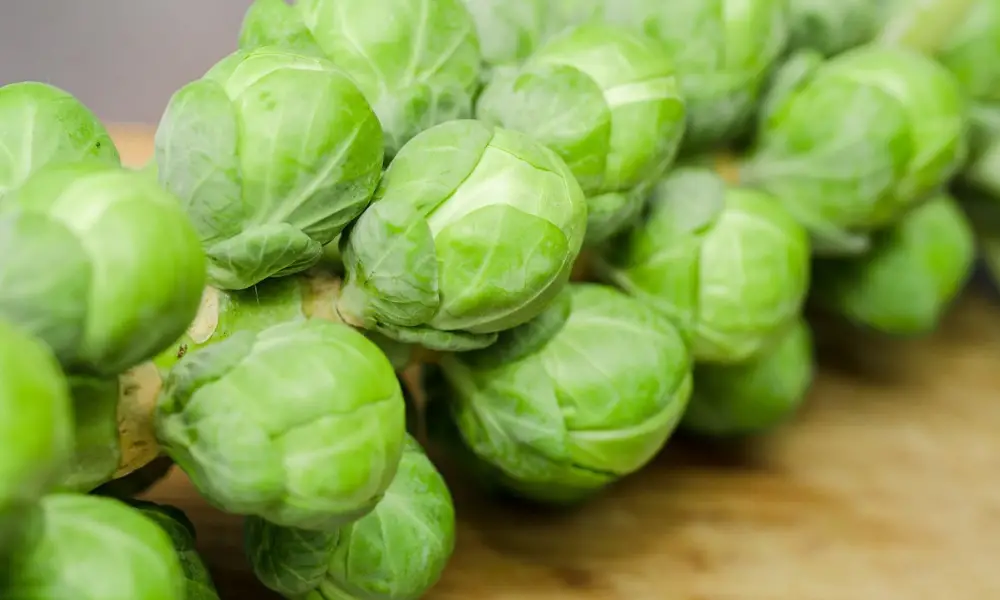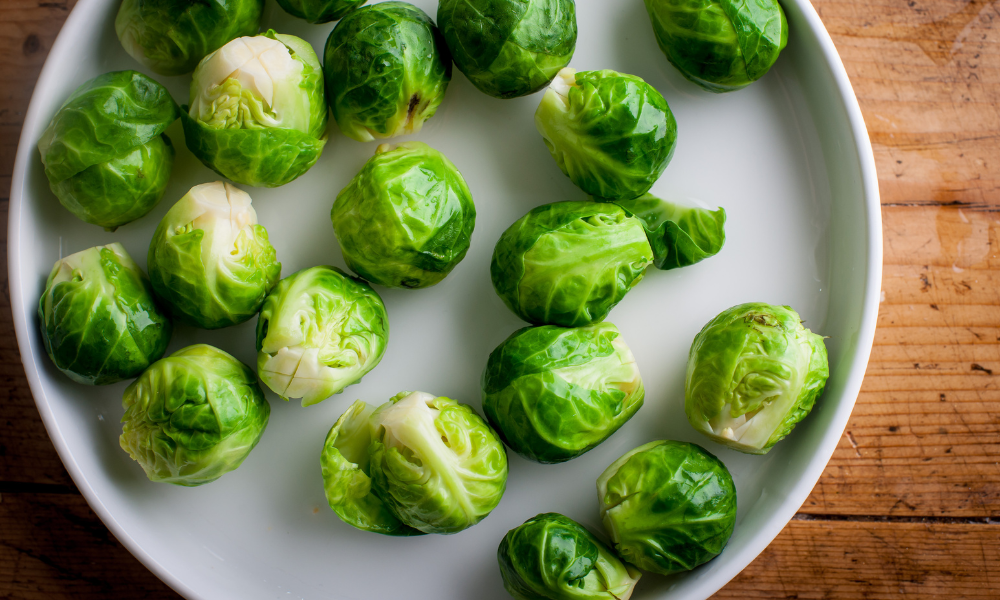Depending on how you prepare them, Brussels sprouts can bring flavor and color to your dinner and be either crispy or mushy. They can add a new texture that truly livens up your food and adds diversity. Many people dislike the scent of cooking Brussels sprouts, but we believe they are missing out on a particular vegetable that occasionally belongs on your dinner table.

We hypothesize that this is due to the abundance of resources like ours that demonstrate novel preparation methods and present Brussel sprouts in a mouthwatering light. Yours can be toasted, grilled, added to a salad, wrapped in bacon (our favorite), boiled, microwaved, steamed, and so much more.
How to Store Brussels Sprouts?
Storing Brussels Sprouts
How should I put Brussels sprouts in the refrigerator? In a plastic bag, keep them away from foods that can infect them. The ideal location to store vegetables is in a drawer designed for that purpose.
When storing Brussels sprouts, should you wash them first? No, wait until you’re ready to prepare them before washing them. Resist the desire to wash them thoroughly, which can shorten their shelf life. Are you concerned that the other goods in the fridge will be impacted by their contamination? So, in part, that explains why we advise putting them in a plastic bag.
Store Brussel Sprouts on the Stalk
Occasionally, you can purchase Brussels sprouts that still have intact stalks or stems. You might even harvest them in this manner from your garden, leaving the stem intact. Can I leave that stem in place?
Let’s speak about how to keep Brussels sprouts on the stalk for a bit.
You don’t need to remove that stem until you are ready to use the sprouts, and this will assist in slightly extending their shelf life.
Pick off only the sprouts that you will use. Store the stem in some water in the refrigerator if you intend to use it later. There, it can be kept in good condition for a few days. You may also keep it in your refrigerator on a moist paper towel. This prevents the stalk from drying out, withering, and turning brown and unusable by keeping it moist and fresh. It is not necessary to preserve the sprouts in water.
Long-Term Storage of Brussels Sprouts
For those who cook only a few small meals daily and live alone, it might be challenging to prevent food waste.
We never use more than a quarter of an onion, a head of lettuce, or one potato every meal. Large grocery purchases are in danger of rotting before being used. Some of the vegetables from our gardens at home can also be wasted. How can Brussels sprouts be kept fresh for more than a few days? To do so would require freezing them.
Brussel sprouts can be frozen for storage if you use an airtight, freezer-safe bag or container. That way, you may store fresh Brussels sprouts without being concerned about them going bad for an extended period. They can last anywhere from a year to a year and a half, but you must first complete a crucial technique.
Brussel sprouts should be blanched before being stored in the freezer, as with many other vegetables. The vegetables are heated quickly and then quickly cooled in this procedure. If you have a blanching basket, you may use it for cooking the Brussels sprouts for 10 minutes in boiling water. The nodes should then be removed from the heat and placed in an ice bath, and they should remain on the ice for as long as they were in the boiling water.
The sprouts should be dried off after they have thoroughly cooled, and they shouldn’t have extra water on them because that could lead to degradation. Immediately put the dried Brussels sprouts into a freezer bag or other freezer-safe container and freeze.
Blanching helps food retain its nutritional content, flavor, and freshness for a long time by stopping the breakdown of enzymes and halting the loss of nutrients.
Store Garden Grown Brussels Sprouts
Fresh vegetables from the garden are the best. It feels so satisfying to cook them up and enjoy the results of your effort after you have personally taken care of them, weeded them, and provided them with water.
How should I keep my garden-grown Brussel sprouts? Select them with the stem and store them in your refrigerator in an airtight plastic bag. Please wait until you are ready to use them before washing them.
Keeping Brussels sprouts on the stalk will keep them fresher for a more extended period. Removing bananas from the bunch will slightly loosen the peel and hasten spoilage; removing Brussels sprouts from the stalk hastens browning and sourness. With the stem still attached, they may not look as delicious, but you are extending their shelf life by a few days.
What is the Importance of Storing Brussels Sprouts Properly?
If you don’t know how to preserve fresh Brussels sprouts, they will be mushy, sour-smelling, or discolored when you want to use them. They won’t resemble anything you would like to put in your food, in other words. Brussel sprouts will get sour and lose their appropriate flavor if they age too quickly. Nobody wants that, so we strongly advise you to adhere to the storage instructions we provide in this article to keep your Brussel sprouts fresh and tasting the way they should.
Brussel sprouts are frequently improperly stored, which is a big reason why they have been so detested by so many people (not just kids) for so long. Of course, no one will want to eat your vegetables if they go wrong. Proper preservation is essential to introduce your children or other family members to this tasty and highly healthful vegetable. Additionally, you should know how long Brussels sprouts stay fresh and how to cook them without destroying their flavor.
Before using your Brussels sprouts, inspect them. They deteriorate if the edges go brown. However, the most vital sign is your nose. Old nodes have a strong, sour aroma similar to old cabbage. Before preparing the sprouts you are storing, take a smell to determine whether they are safe.
Brussel sprouts: How Long Will They Last in the Fridge?
Your Brussel sprouts should keep for around four days if you follow all of our storage instructions. Check them for signs of spoilage if you plan to wait the whole four days to utilize them. Keep an eye out for changing smells and browning edges. We advise you to discard them if in doubt. Eat rotten Brussel sprouts at your peril. They might not only taste unpleasant, but they also have the potential to make you ill.
All vegetables need to be stored safely, and there are a few various strategies you can employ. You should utilize Brussel sprouts much more and increase their shelf life now that you know how to store them in the freezer, refrigerator, and even on the stalk. By doing this, you’ll be able to save money while ensuring that your food lasts longer.
Can Brussels Sprouts be Eaten Raw?
Some people refrain from consuming specific grains, vegetables, and legumes unless they have been cooked out of worry about antinutrients or substances that can prevent the absorption of vital minerals.
Oxalates are present in spinach and phytate levels in soybeans, for example. These naturally occurring substances may prevent your body from absorbing nutrients like zinc, calcium, and iron. Antinutrients are reduced during cooking.
Brussels sprouts contain substances known as glucosinolates, even if they don’t contain some of the most popular antinutrients. Iodine absorption has been observed to be decreased by glucosinolates. A goiter, or excessively enlarged thyroid gland, can develop due to iodine shortage, affecting thyroid function.
Although those who already have thyroid disorders like hypothyroidism may want to limit their intake of glucosinolates, most healthy individuals pose no risk from consuming them as part of a well-balanced diet.
Additionally, glucosinolates seem to have health advantages such as anticancer capabilities.
However, if you’re worried about consuming glucosinolates, it’s better to boil Brassica vegetables like Brussels sprouts to lessen their amount. Most glucosinolates are retained by other cooking techniques, such as steaming.
What are the Different Methods for Cooking Brussels Sprouts?
It’s a common misconception that kids and adults detest Brussels sprouts, but this isn’t always the case. Like many other vegetables, how you prepare Brussels sprouts affects their flavor.
The best way to prepare raw, uncooked Brussels sprouts is to slice or dice them into tiny pieces. Try some of these recipes using raw Brussels sprouts:
Salad. In a salad, combine thinly sliced Brussels sprouts with leafy greens, tomatoes, carrots, and other raw vegetables. Apply your preferred salad dressing to your creation.
Coleslaw. Your whole, raw Brussels sprouts should be grated or shredded and combined with slaw components such as pecans or almonds, olive oil, vinegar, honey, brown mustard, and dried cranberries.
Sandwiches. As you would with spinach or lettuce, thinly slice your Brussels sprouts and use them as layering greens on sandwiches for a satisfying crunch.
Cooked Brussels sprouts are also delectable and should be cleaned, trimmed, and cut into the required form or size. Try preparing them in one of the following ways:
Steamed. A fitting steamer basket should be added to a pot with an inch of water at a boil. Put the Brussels sprouts in the steamer basket, cover them, and steam them for 5-7 minutes, or until they are the required tenderness.
Sautéed. In a skillet over medium heat, warm the olive oil. Sliced sprouts should form a single layer in the skillet after being added. They should be heated for around 5-7 minutes on each side and seasoned with a few pinches of salt, pepper, and either lemon juice or garlic powder.
Roasted. Cut your Brussels sprouts in half, then combine them with a generous amount of olive oil, salt, and pepper. On a baking sheet, arrange them in a single layer and bake them for about 30 minutes at 400°F (204°C).
Boiled. Bring water in a big pot to a boil. Brussels sprouts should be added and boiled for 10 minutes or until a fork can be inserted. Nodes should be drained in a colander before being seasoned with butter, salt, and pepper or as preferred.
What are the Nutritional Consequences of Eating Raw Brussels Sprouts?
Eating raw Brussels sprouts can have the same adverse effects as eating other uncooked cruciferous vegetables like cabbage or broccoli.
Raw Brussels sprouts have a harsh flavor and may make some individuals feel sicker. They contain raffinose, an indigestible fiber that can be hard on the stomach. Bacteria break down these and other indigestible fibers in the large intestine, which releases gases including hydrogen, carbon dioxide, and methane as they do so.
People who already experience digestive issues like irritable bowel syndrome (IBS) or may not be accustomed to eating Brussels sprouts or other similar veggies may experience even more significant discomfort.
Conclusion
The best way to store brussels sprouts is in their organic produce or zip-seal bag. You can store Brussels nodes in the refrigerator for about a week. If you buy loose sprouts, you should discard the outer leaves. A fresh brussel sprout should remain firm to the touch. Remove the outer leaves before cooking; otherwise, they will begin to rot or mold.
And the first step to freezing Brussel sprouts is to remove the nodes from their stalks. Trimming Brussels sprouts is simple but requires patience. When decorating, be careful not to cut the shoots too short; otherwise, they will break and become chewy. Cut the sprouts from the stem below the first few leaves, not the entire stalk. In addition, you should use a sharp knife to cut away the branch.

